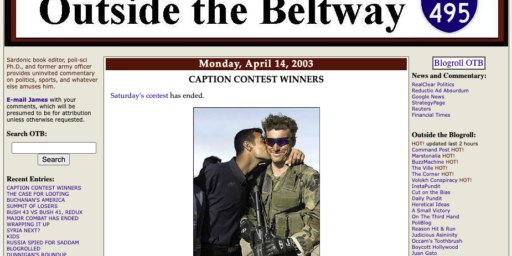Blogs Are Dead, Long Live Blogging
As the medium matures, something important is being lost.
My latest for The Hill, “Blogs Are Dead, Long Live Blogging,” has posted. Written in response to news that The New York Times is phasing out or consolidating “almost half” of its blogs, I reflect on the changes in the medium over the last decade-plus. I conclude:
Over the years, my own blogging production has dwindled, from an average of 13 pieces a day to fewer than that a week. Partly, I’ve tired of feeding the famished animal and of much of the domestic political debate. Partly, I’m doing more of my writing for an outside audience. Mostly, though, blogging has evolved from being a game with traffic and links as the way to keep score to a conversation with a core readership.
Indeed, what I fear being lost in the merger of blogging with other forms of news and analysis on the Web is that loss of conversation. Even blogs without comments sections, such as Andrew Sullivan’s, are a dialogue with the readership. While I enjoy the validation that comes from having my writing accepted by venues like this one, there are advantages to being able to publish anything I want, whenever I want. It allows me to bypass the vagaries of editors and editorial calendars, getting my ideas out there immediately.
Moreover, blogging often amounts to what my one-time teaching colleague and current co-blogger Steven Taylor long ago dubbed “the first rough draft of my thoughts.” Oftentimes, my initial reaction to an event in the news evolves considerably after it’s subjected to reader feedback. Less publishing content simply to feed the beast and more thoughtful content are good things. But one advantage of the blogging format is that it can be an excellent path toward the latter.
More at the link.






I agree, I gave up my own blog but was invited to post at The Moderate Voice. It is a group blog so I can get away with a post every other day or so. Doing several posts a day just got to be too much. I still have a picture blog and a book review blog but the book reviews are published on TMV first.
I might add that it’s the comments section that make blogs attractive to me. I pay Andrew Sullivan but in truth I rarely do because of the lack of comments. I quit reading Hullabaloo when the comments went away. Both OTB and TMV have active comments sections which is what makes them great.
@Ron Beasley: @Ron Beasley: @Ron Beasley: Comments sections are a two edge sword. Some have decent comments sections where readers and comment and discuss; others are just swamps (think yahoo and politico). They are not worth the effort to read. Even OTB gets to the edge of obnoxiousness at times where I would just want to throw my hands up and leave.
@Ron Beasley: This is actually the only blog where I always read and regularly participate in the comments. Even with our pet trolls, it’s a thoughtful and interesting group here.
@Scott: You learn to know which commentators to ignore.
Nice piece for The Hill. Not sure I agree with it, but well-written.
@Ron Beasley:
You also learn which topics aren’t worth participating in because there’s unlikely to be any meaningful discussion even among the good commenters.
@Ron Beasley:
Same here. Of course, that dramatically reduces the number of blogs I’m willing to read, because I require a signal-to-noise ratio of at least 1:1 in the comments. That immediately rules out every mass media outlet and 90% of low-volume blogs. Good thing, because I don’t have time to follow more than I do.
I was just motivated on this subject as Dave Schuler linked to my old blog (hosted by someone else) which expired.
I stopped blogging as it started to seem rather too much like work, and I have (and had) no aspirations to either being a public commentator or a journo) – and I was getting worried about too high a profile. One can’t do my business and also say colourful things in public.
In any case, it seems a general thing that for persons who do not have journo or editorial commentator aspirations as such, this
I am mildly amused that a guest commentator at my old blog (Aqoul) is now an author and commentator (http://www.theguardian.com/profile/nesrinemalik). She was still in the financial sector when she started as a guest chez-moi (I forget the pseudonym however).
In reaction to the first paragraph of your piece, James, I don’t think that blogs are rendering the mainstream media obsolete. It’s the mainstream media that are making the mainstream media obsolete..
That hand was already writing on the wall when newspapers increasingly began to rely on the wire services for their reporting and many just re-published wire service copy, obliterating differences in style and content among papers.
What blogs contributed to the process was demonstrating that good opinion writing didn’t require a newspaper’s imprimatur. As blogs have matured they have shown that newspapers don’t have a monopoly on good reporting, competent interviews, or anything else you might turn to a newspaper for.
Newspapers first became bloggified. Now they’re becoming twitterized. Rather than becoming more hip and relevant by doing so I think they’re actually discarding their own competitive advantage, something accelerated by the move towards automated writing of copy.
Shoemaker, stick to thy last.
This.
I’m not sure how long it has been true that “News” is just another entertainment product, but it has become glaringly obvious in recent years. At that point, I’m going to have to go to other sources to get actual information about the important topics, and I’m going to go to other sources to get the entertainment I prefer.
@Dave Schuler: I think a handful of flagship papers remain very good and important. The vast majority of local papers out there, though, are bloody awful. And, yes, newspaper editorials, op-eds, and columnists are actually pretty weak in comparison to the best of the blogosphere.
@DrDaveT: News has always been about making money and competition naturally drove it to the lowest common denominator. The best news outlets are those like PBS, NPR, and BBC who don’t have to generate revenue on the basis of ratings.
@Dave Schuler: @James Joyner: I think reputable, stylistically ineresting print journalism could survive with a hyper local or hyper regional focus. You are correct that simply reprinting the wire services and using photos of kids playing in fountains in Philadelphia to tell me how hot it is in western Colorado is useless. There may not be enough material for a daily but a weekly or thrice weekly might work. which provides info on local governments and economies. The only area where I see this now is in the alternative weeklies around the country.
@James Joyner:
Those may be the best television/radio news outlets, but they are nowhere near the best news outlets. The sound bite format simply doesn’t lend itself to reporting of any depth or nuance; there are too many stories to get through in the time allotted.
My personal vote for best English-language news outlet at the moment goes to The Economist; I’d welcome other nominations.